INSIDE: Everyone has an opinion on when your baby should start eating solids. But forget about your mother-in-law! And let’s dig into the answers with up-to-date evidence and also bust some myths about signs your baby is ready for weaning.
I was excited to get my first baby eating, although not as anxious as my mother-in-law.
But that’s a whole other story involving a two-month stand-off!
Fast forward nine years to my fourth baby, and I realised there’s no rush! You have the rest of your life to feed your kids.
Bonus: As a bonus for joining my weekly newsletter, get this free cheat sheet ‘Weaning at a glance’.

Let’s cut to the chase! Start introducing solids at ABOUT six months.
The exact timing of when to begin eating solid foods depends on your baby. So what seems like a simple question suddenly gets confusing! Chances are you’ve already come across conflicting opinions about starting solid foods.
From self-styled weaning experts to heated threads in online groups to unsolicited advice from family and friends, you’ll soon find out (if you haven’t already) that everyone’s an expert on the best time to start solids.
You may have heard four months, six months, or sometime in between.
Ready, Steady, Wean-From Confused To Confident In No Time At All
Save yourself time, stress and money and get all the answers you need in one easy-to-follow online course.
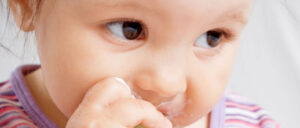
Expert Round-up about when the best time is to start solidsWhy is there so much confusion about the timing of solids for babies?
Expert round-up about when the best time is to start solids
There’s no point in someone on the internet thinking it is the best time to start solids. Let’s look at what the real experts recommend.
And we’re not interested in what one lone expert says, but instead what groups of experts say. Groups of experts come together to develop evidence-based guidelines where they gather and examine ALL of the available evidence (not just one or two studies) about the best time to start solids.
So, let’s take a look at some recent guidelines.
The World Health Organisation say….
The WHO (World Health Organization) recommend the introduction of nutritionally adequate and safe complementary (solid) foods at six months, together with continued breastfeeding up to 2 years of age or beyond.
This recommendation is based on a consideration of the optimal duration of exclusive breastfeeding.
ESPGHAN (European Society of Paediatric Gastroenterology, Hepatology and Nutrition, 2017) say…
Complementary foods (solids and liquids other than breast milk or infant formula) should not be introduced before four months but should not be delayed beyond six months.
SACN (UK Scientific Advisory Committee on Nutrition, 2018) say…
Most infants should not start solid foods (complementary feeding) until around the age of 6 months, having achieved developmental readiness.
And finally, here in Ireland, the Food Safety Authority say…
The health guidelines provided by the HSE (from your PHN/health visitor) are based on this document. And they recommend introducing solid food or weaning at about six months of age.
The recommendations are the same for both formula-fed and breastfed babies.
They also mention that it is safe to start weaning after 17 weeks, but the exact timing will depend upon your baby’s signs of readiness. (FSAI 2012)
Summary of recommendations on when to introduce solid foods to your baby’s diet.
| Recommended by | When | Evidence-Based? |
| WHO | 6 months | Yes |
| UNICEF | 6 months | Yes |
| SACN | About 6 months | Yes |
| FSAI | About 6 months | Yes |
| ESPGHAN | Between 4-6 months | Yes |
| Self-styled ‘weaning expert’ | Around 5 months | No |
Reasons why experts recommend not starting solids before four months of age
- Your baby’s kidneys and gut are not mature enough to handle food
- Breast or formula milk provides everything your baby needs
- Introducing other foods or drinks can displace more nutritious milk
- Adding solids too early can increase the risk of obesity later on
- It can increase their risk of food allergies
- More prolonged exclusive breastfeeding may be associated with a reduced risk of tummy bugs and respiratory infections
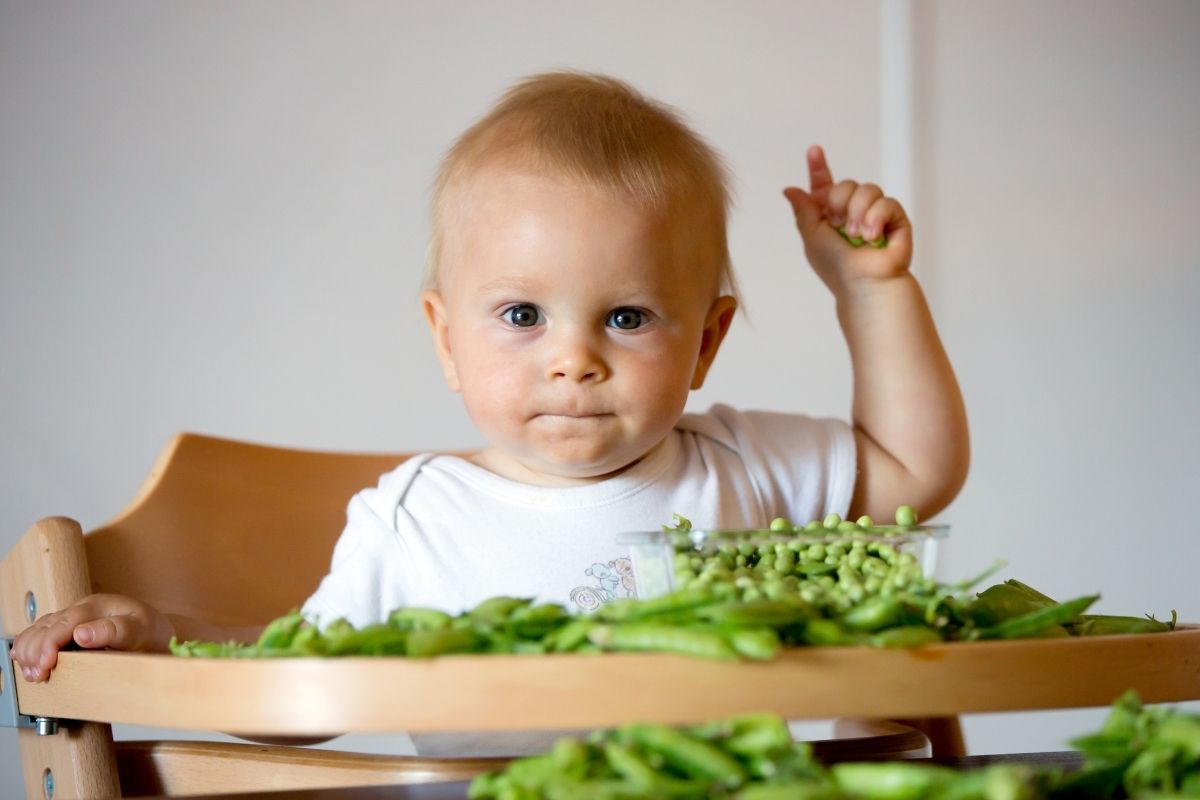
And the myth of ‘food before one is just for fun’!
The catchy rhyme ‘food before one is just for fun’ isn’t strictly true. It should certainly be fun! But solid foods at around six months are needed to give your baby more energy and iron-rich foods.
Milk is still significant to your baby’s nutrition, but it’s not enough all on its own. Your baby also needs to develop its chewing skills.
Plus introducing different textures to your baby stimulates the development of muscles involved in speech and the development of your baby’s mouth.
Introducing potential allergens before your baby’s first birthday also helps to prevent food allergies. How cool is that?
What are the reliable signs that your baby is ready for weaning?
There’s no one perfect age for first food, every baby is different. The best approach is to watch your baby for signs that they are ready for solid foods.
Three clear signs show that your baby is ready for food other than breast milk or formula.
And you will need to see all three signs together. It’s rare to see these three signs together before six months.
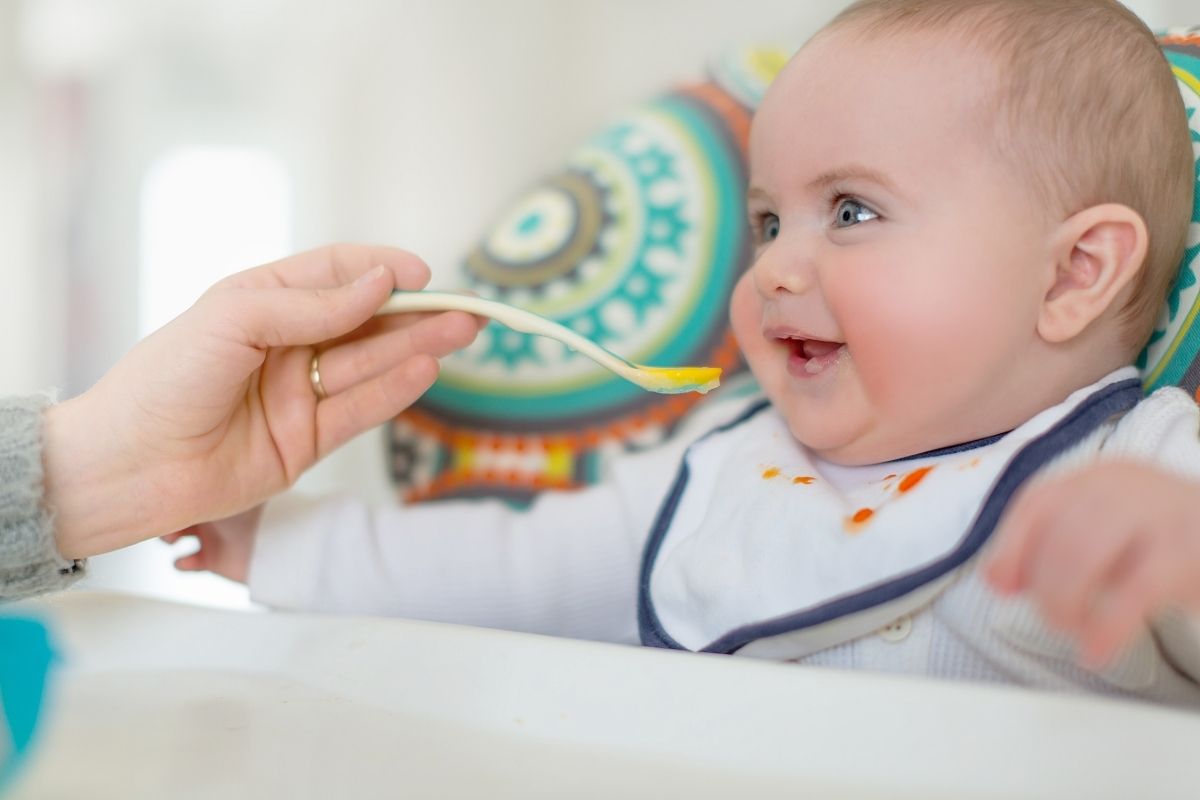
NO 1: Your baby can sit upright with minimal assistance and hold their head up.
Have you ever tried to eat with your chin on your chest? It’s not easy, and it’s a choking risk. So your baby needs to be stable in their core with good head control so that they can eat safely without risking choking.
Can your baby sit for a few seconds without help or with minimal support and hold their head up well?
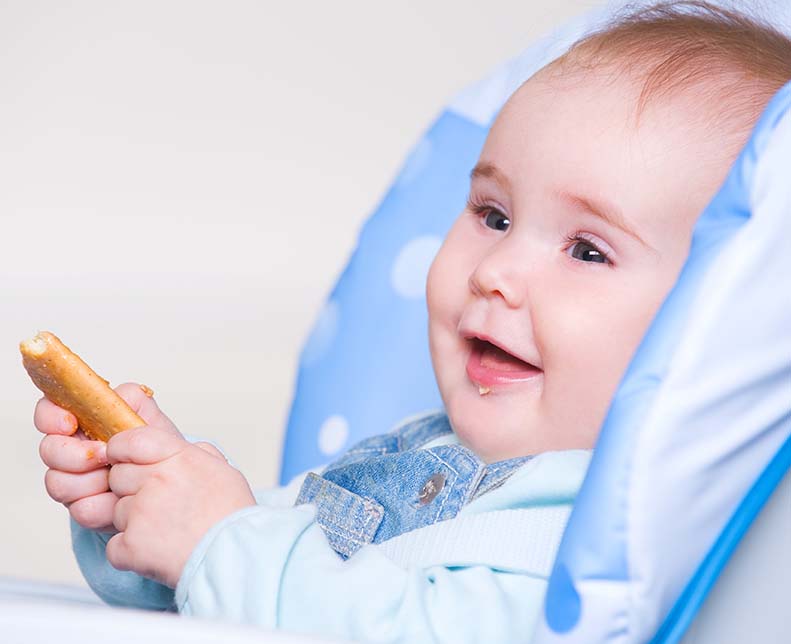
NO 2: They have good hand-eye coordination.
You’ll see your baby look at toys and teethers, pick them up and bring them to their mouth. If they can’t do that, then they’ll struggle with baby led weaning and finger foods.
Your baby shows signs of good hand-eye coordination. Yes or no?
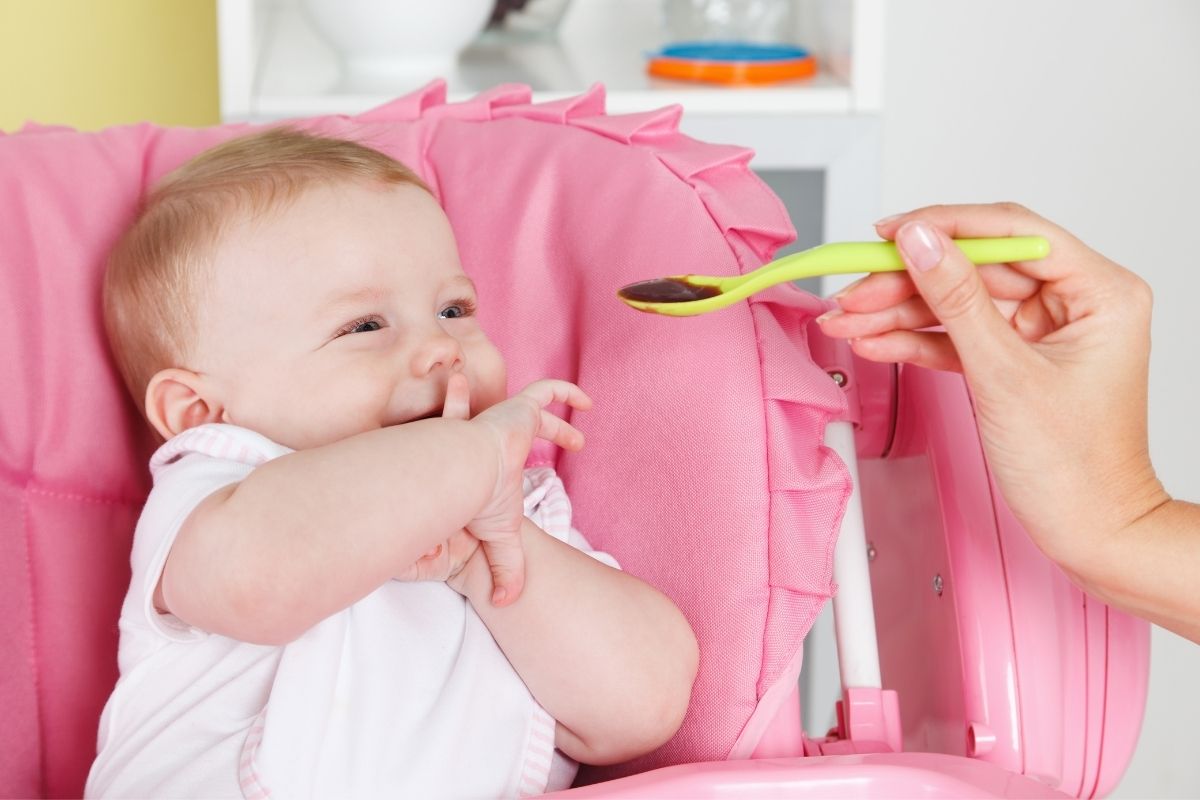
NO 3: They can swallow food.
Have you ever seen funny videos of parents trying to spoon-feed babies who are just spitting it all back out? It’s great for YouTube but not for your baby! Pushing all of the food out with their tongue like this shows that their tongue-thrust reflex is still very active.
Your baby’s tongue-thrust reflex usually fades between four to six months. Trying to feed a baby whose tongue thrust hasn’t faded is frustrating for both of you. You can check by putting your finger on your baby’s bottom lip, and if they stick their tongue straight out, chances are they’re not quite ready yet.
Are the guidelines different for breastfed babies and formula-fed babies?
No, these signs apply to all babies, whether breastfed or drinking infant formula. And regardless of whether you’re planning on offering purées or baby-led weaning.
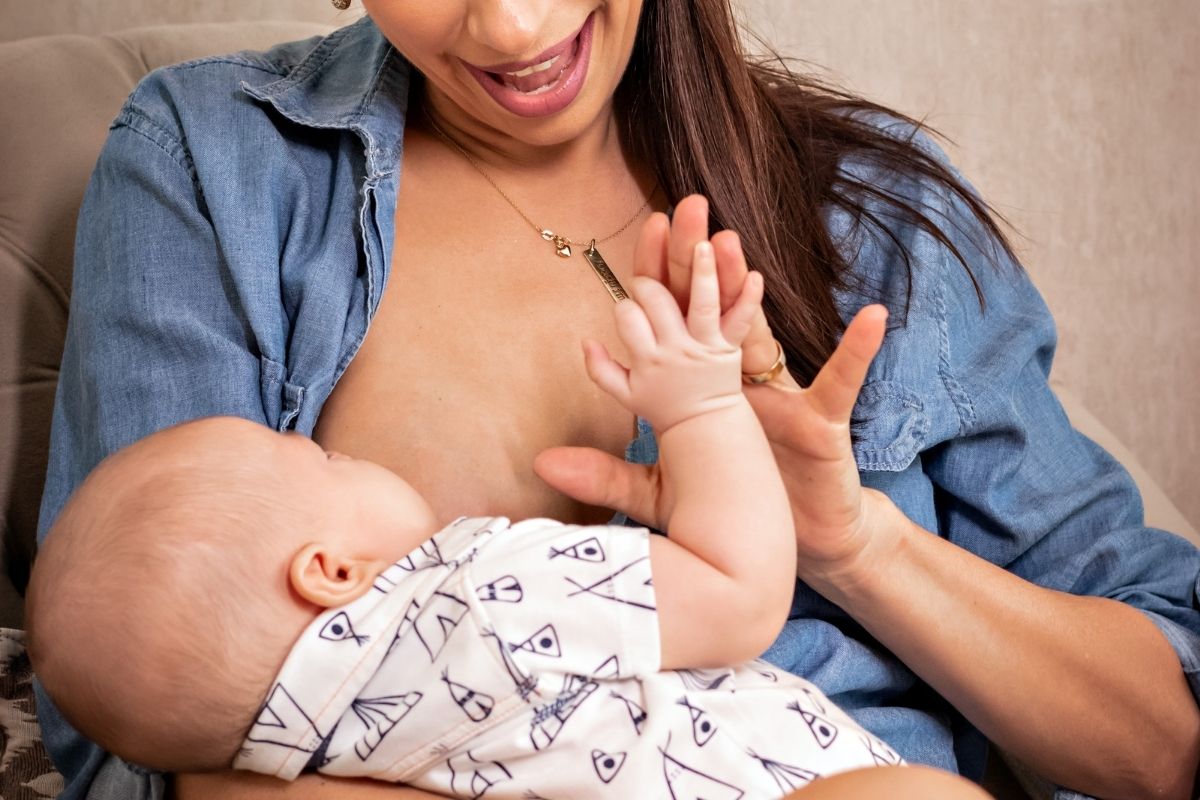
When is a premature baby ready for solids?
If your baby was born early (before 37 weeks), you could start solids begin sometime between ‘corrected age’ 4 and 6 months. But make sure that your baby is showing all the signs of readiness.
What if I think my baby is ready for solids and then realise they’re not after I’ve started?
Don’t worry. You might mistakenly think your baby is ready, and a few days in realise they’re not. If your baby is under six months, stop, wait until six months and start again. Just because you started doesn’t mean you have to plough through.
Although, once your baby is six months of age, it’s important to keep offering new foods. No pressure, though. Eat new food together, relax and let your baby get playful with new food. How much food they eat isn’t important.
Breast milk and infant formula continue to provide lots of nutrition throughout the first year.

Weaning can be a minefield of misinformation!
Now, let’s bust some common myths about the timing of solids
I read online that the best time to start is at 5-5.5 months so my baby can build up to three meals by six months.
There’s a chance that some babies might be ready at five months. But not all or most babies. And this isn’t a good reason to start a baby who isn’t showing all the signs of readiness. It’s not a race!
You can start solids at six months and still build up slowly to three meals a day by about seven months. Starting solids is about introducing new tastes and food textures, not how much food your baby eats.
When you start introducing solid foods at about six months, move quickly from first tastes to a wider variety of foods, particularly those high in iron.
There’s no need to spend weeks and weeks offering only rice cereal (baby rice) or various combinations of fruits and vegetables. It’s a commonly held myth that you need to offer new foods singly before offering mixed meals.
LEARN MORE >>>Starting your baby on solids using a vegetable-first approach
I’ve heard that if you start solids early, then your baby is more accepting of new flavours.
Research doesn’t support the existence of a ‘critical window’ for the acceptance of solid foods between 4 and 6 months. Starting solids at around six months of age is not associated with difficulty in baby’s accepting foods later on.
Certain foods like green vegetables can be harder for baby’s to like, so it’s worth offering them regularly, especially at the beginning. Sweet foods like sweet potato will be devoured but that doesn’t mean that you want to offer the same foods all the time.
Is it better to introduce solids early to prevent allergies?
Unless your baby is high risk and a health professional has advised you to start before six months, there’s no need to start before your baby is showing all the signs of readiness. On the other hand, once you do start solids at six months, aim to begin introducing potentially allergenic foods as soon as you can to help prevent food allergy.
Potential allergens include cow’s milk in an exclusively breastfed baby. Infant formula contains the same proteins as cow’s milk.
LEARN MORE >>> How to introduce potential allergens quickly and safely
My baby is watching me while I’m eating, does this mean he’s ready?
Not necessarily. It’s normal for babies to be interested in new things and in what you’re doing. And this sign alone doesn’t tell you that your baby is ready for baby food. Your baby is interested in everything you do. But are they ready to wear make-up or take the car for a spin?
Remember breast milk or infant formula provides all your baby’s essential nutrients until six months. The only vitamin and mineral supplementation your baby needs is a baby vitamin D3 supplement if they’re exclusively breastfeeding or drinking less than 300mls infant formula.

I know you want to believe it but starting solids doesn’t mean more sleep!
My baby is waking up at night when she previously slept through. Surely some solids will help her sleep a bit longer at night. That’s what my mother keeps telling me!
There’s no evidence that solids help babies sleep any better. Babies wake at night for many reasons that often have nothing to do with hunger. They may be going through a growth spurt and wanting extra milk feeds.
Offer extra milk until they’re ready to begin solid food.
One study showed that babies who started solids at three months slept an average of 17 minutes longer than those who were only starting solids. The differences between the groups got smaller after six months. Think about the reasons above for not starting before four months.
Is it worth 17 minutes of extra sleep?
WATCH THIS >>>Babies and sleep-what to expect
My little man is a buster. Everyone says he needs more than milk due to his size.
Milk can undoubtedly provide enough energy for a baby up to 6 months of age, even if your baby is big and growing quickly.
Milk is a much better source of energy than first baby foods. Think about it, how could a little bit of broccoli (or even porridge) provide more calories and protein than breast milk or formula milk?
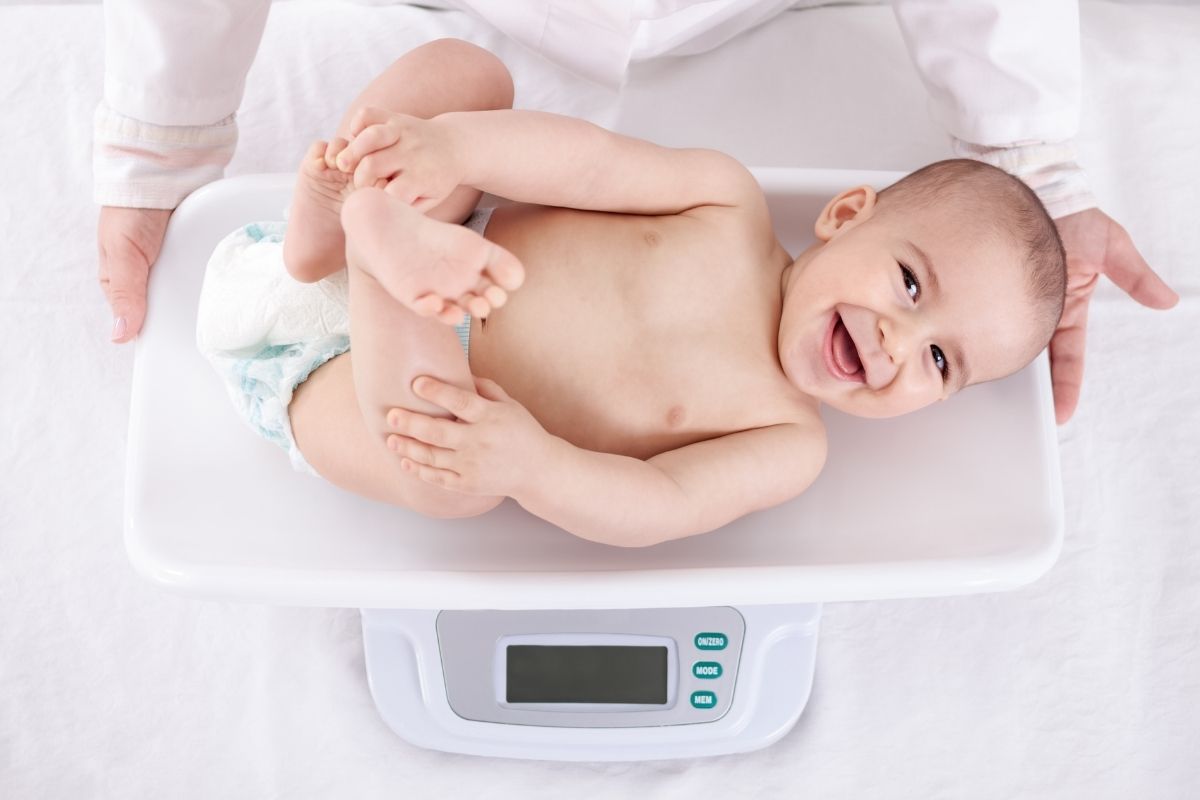
So your baby doesn’t start solids simply because he is big. He’ll get the energy he needs from his milk. Also, being bigger doesn’t mean that your baby is developmentally ready for solid foods.
My little girl always has her fists in her mouth, and I think she’s trying to tell me she’s ready for food.
To be able to eat food, your baby needs to be able to move her tongue to the back of her mouth and swallow. If your baby chews on her fist, this doesn’t tell you she can swallow. However, this is normal behaviour for a small baby; she could just be teething!
Wait for the reliable three signs of readiness before introducing solids.
My baby has reflux, and someone suggested that starting solids might help.
No evidence supports the theory that introducing solids can improve reflux symptoms. For some babies, more solid foods may improve symptoms. For others, solid foods can worsen symptoms, and for many, it makes no difference.
In my experience, a great way to prevent over-feeding (which leads to worsening symptoms) is to introduce solids with finger foods (baby-led weaning) rather than spoon-feeding. Remember your baby needs to be six months for finger foods.
MORE INFORMATION >>> Understanding reflux
People online talk about a baby having an open gut before six months and that it’s dangerous to start solids before then.
Babies are born with what is known as an ‘open gut’. An open gut means that the cells that line the gut have little gaps between them so substances can pass more easily into the bloodstream. But we know that these gaps close up quickly after birth. And that from 4 months onwards the gut is mature enough to handle first foods.

Take Home Message: How to tell if my baby is ready for weaning?
Forget about what your friend is doing, what your mother-in-law did thirty years ago or starting exactly at 26 weeks.
And ask yourself three questions as to whether your baby is showing signs that they’re ready for weaning:
1. Can your baby sit for a few seconds without help or with minimal support (and hold their head up well)?
2. Does my baby show signs of good hand-eye coordination?
3. Has my baby’s tongue thrust started to fade?
If you can answer YES to all three, then Ready, Steady, Wean!
Get Your Free Cheat Sheet
Ready to start weaning? This cheatsheet will give you an overview of the first six months..
- Get the free cheat sheet. You’ll get the cheatsheet, plus join my weekly newsletter! Just click here to get it and subscribe.
- Print or download onto your phone.
- Hang your cheat sheet somewhere handy, like the fridge. Or save it in a folder on your phone.
Ready, Steady, Wean-From Confused To Confident In No Time At All
Save yourself time, stress and money and get all the answers you need in one easy-to-follow online course.



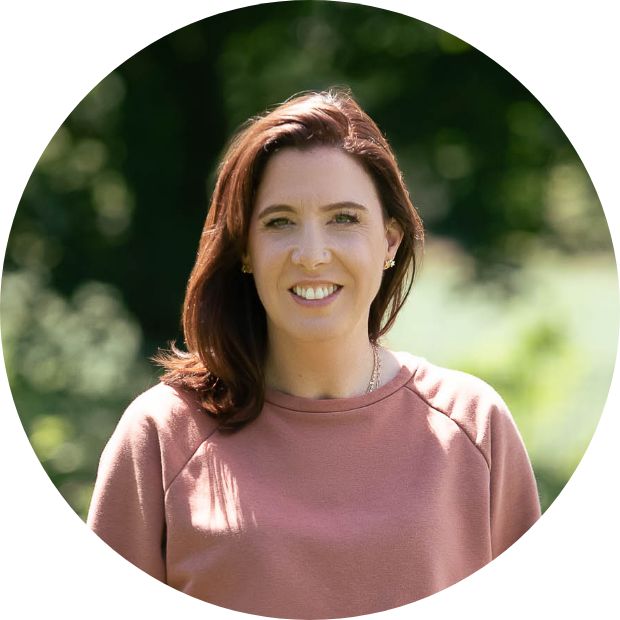

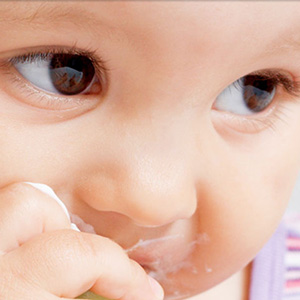
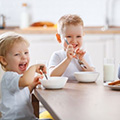

0 Comments